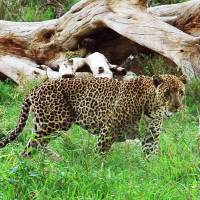Japan's imports of foodstuffs, wood products and other commodities affect 792 endangered species in Southeast Asia and around the world, according to a study on the impact of Japanese consumer habits.
A cup of coffee using imported beans, for instance, may push leopards in Africa to the edge of extinction, the results of a biodiversity footprint survey led by Keiichiro Kanemoto of Shinshu University show.
The study tracked 15,000 commodities imported by Japan for daily consumption and analyzed their impact on about 7,000 endangered species. The researchers used data from organizations including the International Union for Conservation of Nature, which publishes the Red List of threatened species.
In Malaysia, a major exporter of plywood to Japan, deforestation has shrunk the habitats of sun bears and greater spotted eagles, while green turtle species in Papua New Guinea are declining as a result of many of them being caught as bycatch in the process of satiating Japan's appetite for fish, the study said.
Japan is also a major importer of coffee beans and sesame seeds from Ethiopia. The demand generated by its consumers has led to increased land development there, reducing the habitats available to leopards, elephants and other wild animals.
In Spain, the construction of a dam to provide electricity for olive and grape cultivation has led to a decline in the population of the Iberian lynx, a wild cat species native to the Iberian Peninsula. Spanish wine and olive oil are consumed in Japan.
Kanemoto, a specialist in environmental economics, is hoping the study will deepen the people's understanding of how human consumption affects ecosystems and help make it easier for them to choose products that are less harmful to the environment.




